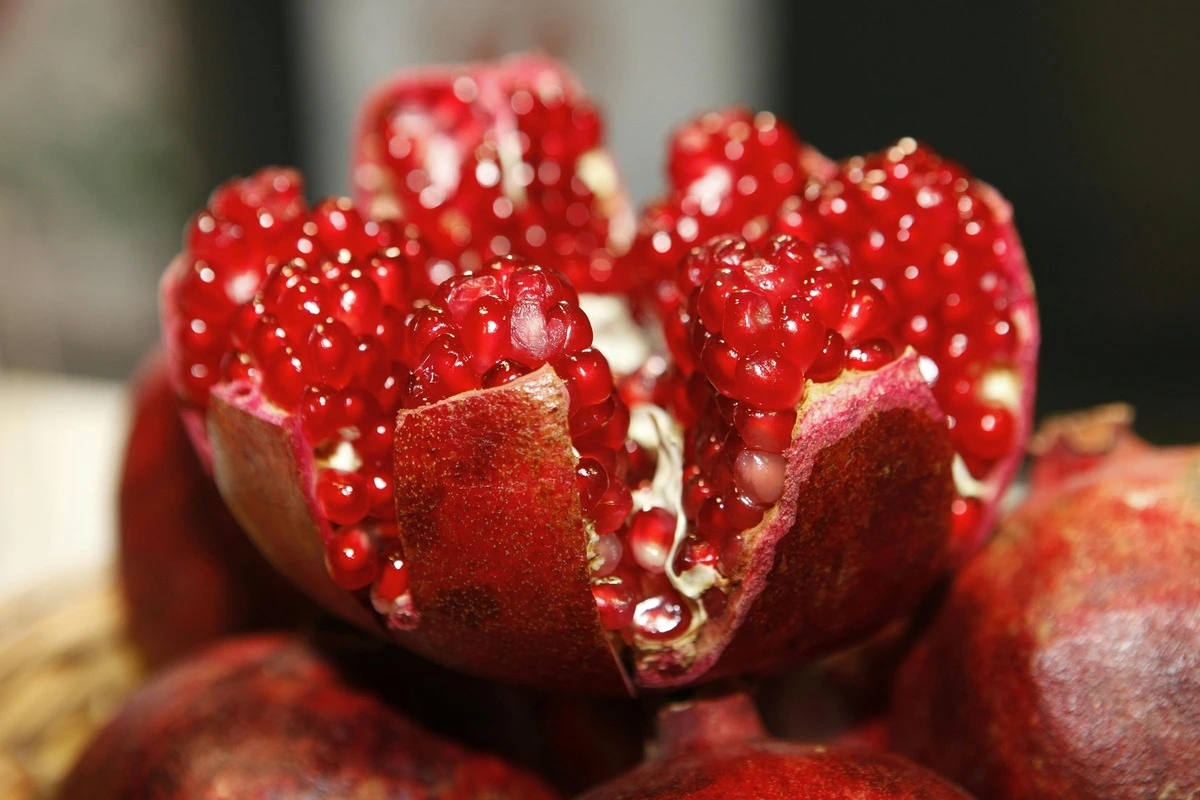ABOUT POMEGRANATE
Pomegranate belongs to the Punicaceae family. Historically, it has been considered a “medicinal fruit.” Pomegranates are in season from September to January. This fruit is packed with healthy nutrients like vitamins, minerals, and antioxidants. It is three times more potent than red wine or green tea in terms of antioxidant concentration (Aviram et al., 2000, Clinical Nutrition).
BIOACTIVE COMPONENTS OF POMEGRANATE
Tannins (gallotannins, ellagitannins, punicalagin, complex tannins, condensed tannins), flavonoids, flavanols, proanthocyanidins, anthocyanidins, phenolic acids (gallic, ellagic, caffeic, chlorogenic, butyric, erucic, ferulic, cinnamic acid), conjugated and unconjugated fatty acids, minerals (K, Na, P, Ca, and Mg), vitamins, phytosterols, phytoestrogen (beta sitosterol), dietary fiber, and nitric oxide.
HEALTH BENEFITS OF POMEGRANATE
Pomegranate’s therapeutic potential has been widely studied in both cancer prevention and chronic disease management. The following sections summarize its role in different health conditions.
• PROSTATE CANCER
Recent studies have found that pomegranate juice or fruit is beneficial against prostate cancer because it slows down the growth of cancerous cells and promotes apoptosis (programmed cell death).
In a Phase II clinical trial (Pantuck et al., 2006, Clinical Cancer Research), pomegranate juice significantly prolonged PSA doubling time in men with prostate cancer.
• BREAST CANCER
Beyond prostate cancer, many in vitro studies indicate the anti-cancer potential of pomegranate extracts, pomegranate juice, and pomegranate seed oil. Fermented pomegranate juice (due to its higher concentration of polyphenols) and pomegranate seed oil (due to punicic acid, palmitic acid, oleic acid, linolenic acid, and stearic acid) are more effective against breast cancer compared to fresh pomegranate juice.
A study by Kim et al., 2002 (Cancer Prevention Research) demonstrated that pomegranate polyphenols inhibited breast cancer cell proliferation and induced apoptosis.
• LUNG CANCER
In addition to breast malignancies, research also suggests that pomegranate may play a role in preventing lung cancer. According to recent research and preclinical animal studies, pomegranate extracts selectively inhibit the growth of lung cancerous cells.
Khan et al., 2007 (Cancer Chemotherapy and Pharmacology) reported that oral administration of pomegranate fruit extract suppressed tumor growth in lung cancer mouse models.
• COLON CANCER
The benefits extend further to digestive tract cancers. Ellagitannins, a type of polyphenol abundantly present in pomegranate, are metabolized by gut bacteria into Urolithin-A, which exhibits anti-cancer activity in the colon. Studies also highlight its potent antioxidant and anti-inflammatory effects.
Larrosa et al., 2006 (Gut) confirmed that urolithins derived from ellagitannins reduce inflammation and protect against colon carcinogenesis in animal studies.
• SKIN CANCER
Besides internal cancers, pomegranate extracts, juice, and seed oil exhibit profound anti-cancer effects against UVB-induced skin cancer.
Afaq et al., 2005 (PNAS) found that topical application of pomegranate polyphenols reduced UVB-mediated skin damage and carcinogenesis.
• HEART HEALTH
While its anticancer benefits are remarkable, pomegranate also demonstrates significant protective effects on cardiovascular health.
• ATTENUATION OF INFLAMMATION
Ellagitannins, anthocyanins, and anthocyanidins are potent bioactive nutrients that reduce markers of inflammation and oxidative stress, thereby lowering the risk of cardiovascular events.
Esmaillzadeh et al., 2004 (Atherosclerosis) showed that pomegranate juice reduced oxidative stress and inflammation markers in patients with type 2 diabetes.
• LOWER BLOOD PRESSURE
Another important cardiovascular effect is blood pressure regulation. Eight clinical trials have found that pomegranate reduces systolic and diastolic blood pressure. Some studies suggest that pomegranate may lower only systolic blood pressure by inhibiting serum angiotensin-converting enzyme activity, while diastolic pressure remains unchanged. Pomegranate juice is rich in potassium but low in sodium and phosphorus, making it ideal for lowering blood pressure.
Asgary et al., 2013 (Plant Foods for Human Nutrition) reported that daily pomegranate juice intake reduced systolic blood pressure in hypertensive patients.
• LIPID PROFILE AND POMEGRANATE
In addition to blood pressure, pomegranate may also influence lipid metabolism. Some researchers report that pomegranate reduces triglyceride levels while serum cholesterol and glucose remain unchanged. However, small studies indicate that pomegranate, due to phytosterols, stanols, and steroidal cholesterol, competes with cholesterol for intestinal absorption, resulting in reduced blood cholesterol levels. Hence, findings remain mixed regarding pomegranate’s role in cholesterol reduction.
Davidson et al., 2009 (AJCN) found no significant effect on cholesterol, while Aviram & Dornfeld, 2001 (Clinical Nutrition) reported decreased LDL oxidation and improved lipid profile.
• ANTI-ATHEROGENIC EFFECTS OF POMEGRANATE
Beyond cholesterol levels, pomegranate prevents oxidation (damage) of LDL (bad cholesterol), which is one of the leading causes of atherosclerosis (plaque formation). As a result, it increases blood flow through arteries by clearing blockages.
Aviram et al., 2004 (AJCN) demonstrated that pomegranate juice consumption reduced carotid intima-media thickness in patients with atherosclerosis.
• ANGINA AND POMEGRANATE
By improving arterial flexibility, pomegranate also minimizes the risk of chest pain or angina due to the presence of nitric oxide, which causes vasodilation and improves blood flow.
Rosenblat et al., 2006 (ATVB) showed that pomegranate polyphenols improved endothelial function and enhanced nitric oxide bioactivity.
• RHEUMATOID ARTHRITIS AND OSTEOARTHRITIS
Apart from cardiovascular support, pomegranate shows promise in managing chronic inflammatory conditions like arthritis. Several in vitro, animal, and human studies show promising results of pomegranate extracts against rheumatoid arthritis and osteoarthritis. Benefits include reducing inflammation and oxidative stress and blocking enzymes responsible for cartilage damage, mainly due to flavanols.
Shukla et al., 2008 (Nutrition) reported that pomegranate extract inhibited matrix metalloproteinases (MMPs), enzymes involved in cartilage degradation.
• POMEGRANATE AND REPRODUCTION
Interestingly, researchers have also explored its influence on reproductive health and fertility. There is no strong scientific evidence supporting pomegranate’s role in fertility. However, some theories suggest it may promote uterine health by reducing inflammation and oxidative stress, increasing blood flow, and preparing the uterine lining for implantation.
Pomegranate contains phytoestrogen (beta-sitosterol), which may stimulate estrogen production, especially in women with hormonal imbalance. In men, regular consumption of pomegranate juice not only improves sperm count, quality, and motility but also increases testosterone levels. Nitric oxide in pomegranate enhances blood flow and is effective against erectile dysfunction.
Forest et al., 2007 (IJIR) reported that pomegranate juice improved erectile function scores in men with mild to moderate ED.
• ANTI-BACTERIAL, ANTI-FUNGAL, AND ANTI-PARASITIC EFFECTS
Beyond chronic disease prevention, pomegranate also exhibits antimicrobial properties. Phenolic compounds, tannins, flavonoids, and alkaloids in pomegranate inhibit the growth of bacteria (E. coli, Staphylococcus, Salmonella), parasites (Giardia lamblia, Plasmodium falciparum), and fungi (Candida albicans, Aspergillus niger, Fusarium solani) by disrupting cell walls, inhibiting enzyme activity, and interfering with protein or metabolic processes.
Voravuthikunchai et al., 2005 (Journal of Ethnopharmacology) confirmed antibacterial activity of pomegranate extracts against E. coli and Staphylococcus aureus.
• BRAIN AND MEMORY
The benefits also extend to the nervous system. Pomegranate improves brain health by reducing neuroinflammation through the reduction of oxidative stress, thereby enhancing cognitive function and memory. According to preclinical and clinical findings, pomegranate supplementation has potential against Alzheimer’s disease progression and memory preservation.
Bookheimer et al., 2013 (Evidence-Based CAM) showed that pomegranate juice improved memory and brain activity in older adults.
• POMEGRANATE AND DIGESTION
In addition to brain health, pomegranate contributes to digestive wellness. According to a 2023 review, pomegranate increases beneficial gut bacteria and decreases harmful types. Its healthy, gut-friendly fiber and polyphenols act as prebiotics, supporting gut microbiota. As a result, beneficial bacteria flourish, gut lining improves, inflammation decreases, and risk of inflammatory bowel disease is reduced.
Li et al., 2023 (Frontiers in Nutrition) reviewed the prebiotic role of pomegranate polyphenols in modulating gut microbiota.
• POMEGRANATE AND DIABETES
Finally, pomegranate also plays a role in blood sugar control. It is considered a low-sugar fruit for diabetic people, but portion size and total carbohydrate intake should be monitored. Animal and human studies suggest it improves fasting blood sugar levels in diabetic patients.
Tzulker et al., 2007 (J. Agric. Food Chem.) found that pomegranate juice reduced oxidative stress in diabetic patients and improved glucose metabolism.
PRECAUTION FOR PEOPLE WITH KIDNEY PROBLEMS AND DIABETES
Despite these benefits, not all patients with kidney disease and diabetes will be safe with pomegranate consumption. In certain cases, due to its high potassium concentration, it may be unsafe. Therefore, consultation with a healthcare provider is necessary.
CONCLUSION
From cancer prevention to cardiovascular protection, arthritis management, and even memory preservation, pomegranate proves to be a fruit with diverse medicinal value. Loaded with vitamins, minerals, and antioxidants, it deserves a regular place in the daily diet.
Frequently Asked Questions (FAQs)
1. Is pomegranate good for diabetes?
Yes. Pomegranate is considered a low-sugar fruit and may help improve fasting blood sugar levels. However, portion control is essential, and diabetic patients with kidney problems should consult their doctor before regular use due to its potassium content.
2. Can pomegranate juice lower blood pressure?
Several clinical studies suggest that pomegranate juice can reduce systolic blood pressure, likely due to its antioxidant content and ability to improve blood vessel function.
3. Does pomegranate help prevent cancer?
Research shows that pomegranate extracts, juice, and seed oil have anti-cancer potential by slowing cancer cell growth and promoting apoptosis. Evidence is strongest for prostate, breast, colon, lung, and skin cancers.
4. Is pomegranate good for the heart?
Yes. Pomegranate helps lower inflammation, prevents LDL oxidation, supports healthy arteries, and may reduce the risk of chest pain (angina) through its nitric oxide content.
5. Can pomegranate improve memory and brain health?
Pomegranate’s antioxidants may reduce neuroinflammation and improve cognitive function. Some studies suggest benefits in slowing Alzheimer’s progression.
6. Are there any risks of eating pomegranate?
Generally safe, but people with chronic kidney disease and diabetes should be cautious due to its high potassium content. Always consult your healthcare provider.
DISCLAIMER
This article is for educational purposes only and should not replace professional medical advice, diagnosis, or treatment. Always seek the guidance of your physician, pharmacist, or qualified healthcare provider before making dietary or medical changes.
CALL TO ACTION
Pomegranate is more than just a fruit it’s a natural powerhouse of antioxidants and nutrients that can support your heart, brain, and overall health. Start adding fresh pomegranate seeds or juice to your diet today, but remember: moderation and medical guidance are key.
Explore more science-backed health articles on Pharma Healths to take control of your wellness journey.
REFERENCES
1. Lansky EP, Newman RA. Punica granatum (pomegranate) and its potential for prevention and treatment of inflammation and cancer. J Ethnopharmacol. 2007;109(2):177–206.
2. Aviram M, Dornfeld L. Pomegranate juice consumption reduces oxidative stress, atherogenic modifications to LDL, and platelet aggregation: studies in humans and in atherosclerotic apolipoprotein E–deficient mice. Am J Clin Nutr. 2001;71(5):1062–1076.
3. Jurenka JS. Therapeutic applications of pomegranate (Punica granatum L.): a review. Altern Med Rev. 2008;13(2):128–144.
4. Thomadaki H, Tsiapara AV, Vassilakopoulou V, et al. Antiproliferative and apoptotic effects of pomegranate extracts in human breast cancer cells. J Med Food. 2004;7(3):274–283.
5. Shukla M, Gupta K, Rasheed Z, et al. Consumption of pomegranate extract inhibits inflammatory pathways in interleukin-1β–stimulated human chondrocytes. Arthritis Res Ther. 2008;10(5):R45.
6. Faria A, Calhau C. The bioactivity of pomegranate: impact on health and disease. Crit Rev Food Sci Nutr. 2011;51(7):626–634.
7. Medjakovic S, Jungbauer A. Pomegranate: a fruit that ameliorates metabolic syndrome. Food Funct. 2013;4(1):19–39.





This blog post tackled a complex subject and broke it down into easily understandable chunks. The author’s ability to simplify and explain concepts is impressive. Well done!
Give a round of applause in the comments to show your appreciation!